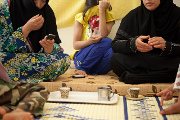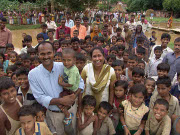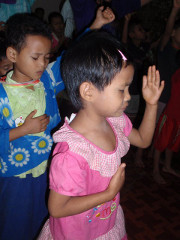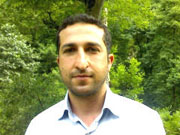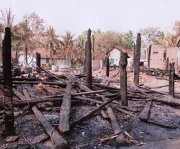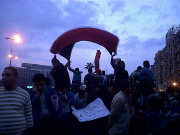 |
| (Cover photo by Sharif Hassan. Story photo by MA3T, file footage Egypt protests 2011) |
Egypt (MNN) ― A potentially ugly confrontation is brewing in one of the Arab Spring countries.
Friday August 24 has been dubbed Egypt's "Second Day of Anger." The actions of President Mohamed Morsi 12 days ago fueled the tensions.Open Doors President and CEO Carl Moeller explains, "There's a lot of disaffection among Coptic Christians about the one-party de facto situation in Egypt with the Muslim Brotherhood being the primary winner of all the elections and everything that has gone on--the power that's being consolidated in the presidency right now."
Fearing a turn toward an Islamic state, Moeller adds, "Many in Egypt, including secularists and evangelicals, also feel like the Revolution has been stolen, and so they're calling on people to take to the streets in opposition to this 'one-party man' show, they're saying, which, in effect, could be highly confrontational. "
Hostility ratcheted up a notch when the top Sunni Muslim cleric issued a fatwa. His decree labeled demonstrators as "infidel," which essentially legitimized the killing of protestors who were marching in the nationwide rallies.
Christians say all they want to do is restore the objectives and accomplishments of Egypt's historic January 25th Revolution. Being on the streets will be dangerous in two ways, Moeller says. One: if there is a violent response to the demonstration, and two: "As the Muslim Brotherhood, they've called for people to stay home. Those that come out in the streets are obviously singling themselves out as not participating in the Muslim Brotherhood, not listening to their agenda, and it could be violent against, what is essentially, the Christian community."
People are nervous, dreading the potential chaos that could erupt and drag on. "Who knows what tomorrow holds? In something like this, the Church can easily be the target of the anger of a mob because it represents sort of 'opposition' to what's happening politically," he adds, but that's where prayer comes in. "The Church is praying that this protest, this demonstration, remains peaceful. [They're praying] that, on the Christian side, they are not going to do anything to provoke or overly antagonize the government. They're praying that the government shows great restraint in allowing this protest to take place."
The scenario is vague. There could be a swift, irrevocable response. The response could be delayed, or there may not be an official response at all. Moeller says the last time the Christian community was silenced, the end result was not a squashing of faith, at all. In fact, he says marginal Muslims have been drawn to the message of Christ. "The need for Bibles, the desire for Bibles, training, Muslims coming to faith in Christ: those numbers are all way, way up. A lot of the overt Christian ministry has been reduced somewhat because there's difficulty in carrying on programs if there's no infrastructure and no security to carry them out."
Crackdowns would only slow things down, but not stop the advance of the Gospel. The question is: how extreme will the response be?
Egypt is holding her breath, on her knees. Will you join her? Our Featured Links Section has more.
